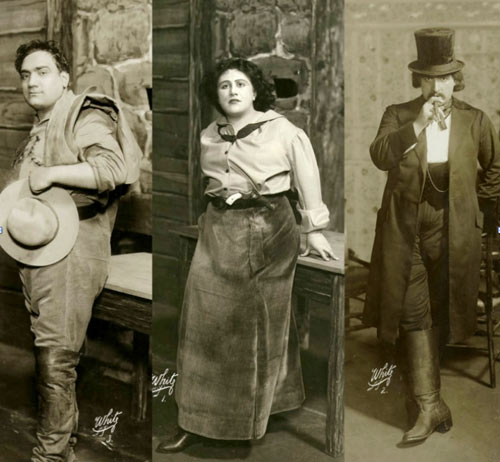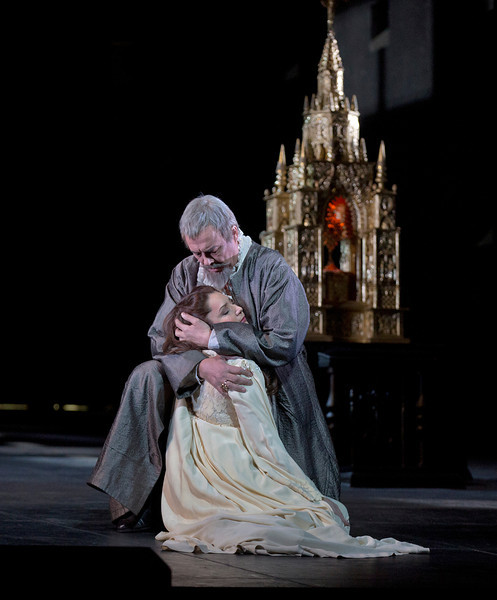 |
| Fanciulla del West's first cast (1910) |
Thursday, March 28, 2013
Aspergimi d'issopo e sarò mondo: Puccini's "Girl" and her gospel
Thursday, March 21, 2013
Eliogabalo: eccomi trasformato
Friday, March 15, 2013
Bach's Mass in B Minor with the NYPhil
I have to accept the way [Bach] believed. His music never stops praying.... I do not believe in the Gospels in a literal fashion, but a Bach fugue has the Crucifixion in it—as the nails are being driven in. --György Kurtág
This week, the New York Philharmonic's ongoing Bach Variations festival brings a deeply impressive slate of soloists to join the orchestra and the New York Choral Artists as Alan Gilbert leads his first performances of the B Minor Mass; I attended the first of these on Wednesday. For me, this was the first live performance of a piece I've listened to countless time since it taught me, when I was seven, that grown-ups could cry, and it's music I love deeply. It's music that's prayed with me and that has prayed for me when I could not. Under Gilbert's baton, the order and beauty of the baroque were celebrated in all their magnificence. Collectively and severally, the members of the orchestra delivered passionate and polished performances. And the evening led me to ponder: when it comes to Bach--especially when it comes to this Bach--can one achieve excellence without confronting eternity?
Tuesday, March 12, 2013
Stephanie Blythe sings the 20th Century at Carnegie Hall
 Despite some empty seats, the Monday night audience for Stephanie Blythe and Warren Jones was one of the most warmly enthusiastic I've heard for a vocal recital. And such enthusiasm was justified: Blythe and Jones had enormous musical and personal chemistry, and Blythe united consummate comic timing with her formidable vocal gifts. The evening opened with James Legg's Twelve Poems of Emily Dickinson, a cycle written for Blythe shortly before the composer's untimely death. Blythe and Jones read the poems before performing the cycle, in place of providing a booklet with texts; I'd love to see this practice spread. Legg's evocative, richly colored settings tied the poems together in a poignant and thoughtful narrative. The asynchronous timing for voice and piano in "There's been a Death, in the Opposite House" established deftly the unsettled mood, and Legg continued to use the piano to color the text strongly, to paint thoughts shattering on stone, the hot thickness of clover, the slow glory of a sunrise. Blythe's use shading of dynamics and her wide palette of tonal color made for an emotional subtlety somehow surprising from so large a voice. The dramatic twist at the end of the cycle, from "Success is counted sweetest" to " 'Tis not that Dying hurts us so" I found thoughtful and affecting. Samuel Barber's "Three Songs," setting the poetry of James Joyce, were also new to me. While given with technical mastery and finesse by Blythe and Jones, I felt that Barber's lush neo-Romanticism sat strangely with the spare beauty of the poems ("Rain has fallen," "Sleep now," "I hear an army.") The lover's invitation to "Come among the laden trees" marks a break from the traditional bower of romance in a way that Barber's harmonies do not; but this quality, which I found jarring, was one of the cycle's attributes most appreciated by my companion.
Despite some empty seats, the Monday night audience for Stephanie Blythe and Warren Jones was one of the most warmly enthusiastic I've heard for a vocal recital. And such enthusiasm was justified: Blythe and Jones had enormous musical and personal chemistry, and Blythe united consummate comic timing with her formidable vocal gifts. The evening opened with James Legg's Twelve Poems of Emily Dickinson, a cycle written for Blythe shortly before the composer's untimely death. Blythe and Jones read the poems before performing the cycle, in place of providing a booklet with texts; I'd love to see this practice spread. Legg's evocative, richly colored settings tied the poems together in a poignant and thoughtful narrative. The asynchronous timing for voice and piano in "There's been a Death, in the Opposite House" established deftly the unsettled mood, and Legg continued to use the piano to color the text strongly, to paint thoughts shattering on stone, the hot thickness of clover, the slow glory of a sunrise. Blythe's use shading of dynamics and her wide palette of tonal color made for an emotional subtlety somehow surprising from so large a voice. The dramatic twist at the end of the cycle, from "Success is counted sweetest" to " 'Tis not that Dying hurts us so" I found thoughtful and affecting. Samuel Barber's "Three Songs," setting the poetry of James Joyce, were also new to me. While given with technical mastery and finesse by Blythe and Jones, I felt that Barber's lush neo-Romanticism sat strangely with the spare beauty of the poems ("Rain has fallen," "Sleep now," "I hear an army.") The lover's invitation to "Come among the laden trees" marks a break from the traditional bower of romance in a way that Barber's harmonies do not; but this quality, which I found jarring, was one of the cycle's attributes most appreciated by my companion. Friday, March 8, 2013
Don Carlo: lo spirto che vacilla
 |
| Filippo (Furlanetto) mourns what might have been. Frittoli is Elisabetta. Photo (c) Met Opera |